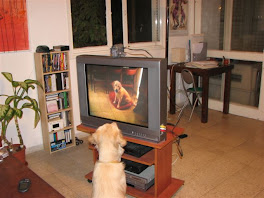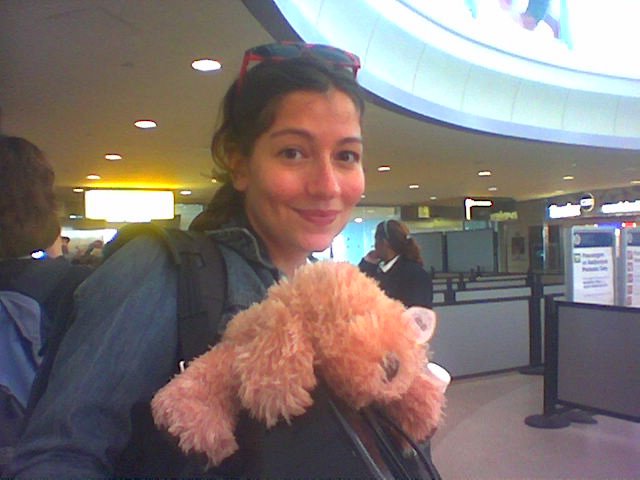The transition's hit me. I feel like I'm going through jet lag now, after having been back for more than four months. I remember that number, because right after I got back, I was a sucker and bought one of those salon package specials a guy tried to sell me outside the subway. Haircut, manicure, "hand massage" blah blah blah. I went for the haircut, but of course, after she tried to sell me a fortune's worth of crap and get me to dye my hair, and after she only very reluctantly, rolling her eyes, cut the bangs I was asking for (which I like very much, thank you) I thought, maybe I wouldn't get such a good hand massage here. Anyway, the thing was valid for four months, and I kept trying to use it as incentive to stop biting my nails: that I could get a manicure. But I didn't. And four months are up.
Come to think of it, that story sounds like something that could have happened in Tel Aviv.
Anyway, I don't know why I expected that with a new teaching job- where I've somehow convinced people I could lead orchestra! (Gosh, I hope none of my students are reading this. If so, um, hi! Go practice!) and with being back in the freelance pool, and starting to try- I mean trying to start- my own non-profit... that I could STOP biting my nails.
Things are really good, though. So much has happened and passed that I wanted to write about. Discovering the "Freaks and Geeks" DVDs (it's embarrassing that's the first thing that came to mind), getting really into practicing solo stuff again... Our trip to California for Christopher's brother Bryan's wedding was incredible. I got to spend good time with Christopher's friends and family, and met some wild, super interesting people. He and our niece and nephew and I went out for an 8:30 AM canoe trip our first morning there. Christopher and Riley were rowing in the front and back, Chloe and I were passengers in the middle, all of us in a straight line. Chloe wanted to paddle, so Riley handed her his oar. A few seconds later we were all in the water, and the canoe was upside-down. That's all we know. We tried digging for answers, but there seemed to be none, just shrugs. The wedding was at Lake Zaca, north of Santa Barbara, which is, we were told, the only natural lake in California besides Lake Tahoe. Is that true? And, we were told, no one has ever found the bottom, it's so deep. AND Al Capone "disappeared" some slot machines there in the 30's, or alcohol during Prohibition, or something. AND Keith Richards swam in it. So you can imagine, we were nervous having taken Riley and Chloe out and dunked them into the middle of the bottomless lake, and their grandparents were on the shore, watching. Luckily, the water was warm, and their Dad and Grandpa rowed another canoe out to rescue us. Chloe held on to one side of it, and Riley and I on the other, me trying not to freak out that Riley was starting to shiver all over. Their grandpa and I started singing to boost the morale. I started "Hokey Pokey," which got Riley singing, and "Always look on the Bright Side of Life," whistling and all. David sang "Old Man River." He had a beautiful voice! Poor Christopher stayed in the middle and made sure our canoe didn't sink. They went back and got him after they dropped us at the shore. Since our cabins didn't have hot water (they later turned it on) Olya ran a bath for me an Chloe in her cabin, and Bryan ran a bath for Riley and Christopher in his. So Chloe and I got a sneak peek at the 3 red linen dresses, a traditional Russian wedding gown in pieces I guessed, that would be worn in layers by Olya, later at the ceremony. Bryan, for his part, wore a Scottish dress outfit, with white lace spilling all over the place, and big funny wool socks.
Something about that story just made me think of this great title one of Christopher's students gave to an essay about her summer. It was called "I Was Swimming."
I love that.
I'm dropping off, and there's a gorgeous heavy rain coming down outside that's distracting me. I just had to put this link in for an interesting
article about musical blogs in the New Yorker. The best part about it was that it led me to a beautiful http://www.blogger.com/img/gl.link.gif
description of the experience of playing Messiaen's "Quartet for the End of Time" by the pianist Jeremy Denk. That's one of those pieces, like Beethoven piano trios, that makes me angry at the composer for not writing a viola part.
AND I had to pay my respects to a great man. The man who founded "Rudy Hazucha's Suzuki Kazoo School." He also did a lot of other great things, like starting the Suzuki camp I went to in Virginia for nine (!) years. But what I remember best is how at every final concert, there would be a performance by Rudy Hazucha's Suzuki Kazoo School. We all had to play a Suzuki song on kazoo. The faculty got so into it, that was the best part. That camp was so so so so so so fun. It's far away, so I don't get to give it props the way I do Third Street all the time. But I want to get Suzuki-certified, or have a baby quick and make it play Suzuki, just so I have an excuse to go back there. The institute was only a week, but it took several days (or what felt like it to me at the time) to get there. My mom and dad and I would drive through Pennsylvania Dutch country, or down the Maryland coast, and through the Blue Ridge Mountains and Shenandoah Park to get there. And then the week would feel like a month, so much would happen, but it also would be over before you knew it. We'd always do fiddling. One year MR. Hazucha brought Jay Ungar down, and we played "Ashokan Farewell" (which was later the theme song to the PBS Civil War documentary).
I feel funny eulogizing someone I didn't know very well. I was one of (what felt to me like) thousands of other kids there. And Mr. Hazucha definitely scared me; he was a disciplinarian, and we all had violins so we just wanted to make noise all the time. Boy, do I feel his pain now! It's Karma, or something, that now I'm the one saying "you practice at home. Here we play together." But Mr. Hazucha also had a charismatic and warm sense of humor. And that place, that institute, was his baby, and he brought the most wonderful teachers, teachers I still remember with a lot of love. It's good to be reminded of how much there is to aim for, how much you can maybe do from the front of the room.
There's a nice profile of Rudolph Hazucha
here.







